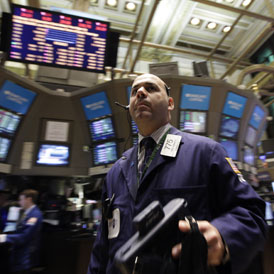Shares fall after early rally
After partially recovering in early trading, shares in markets across Europe have fallen by between 1.5 per cent and 2.5 per cent, with the FTSE slumping below the 5000 mark.

Britain’s top shares dropped back on fears that European banks will have to accept further losses on their exposure to Greek debt, as confidence was knocked by policymakers’ current inability to take decisive action.
The FTSE 100 index had sunk 80.33 points, or 1.6 percent, to 4,961.28 by 1143, retreating from an early high of 5,105.38, pressured by miners as fears over the state of the global economy knocked metals prices.
The partial recovery in share prices this morning followed assurances from the G20 group of leading economies that action will be taken to stabilise the markets.
Britain’s FTSE share index opened 1 per cent higher the day after the City endured its worst trading session for three years with a 4.7 per cent fall. Share prices also rose in France and Germany, having suffered similar falls on Thursday. But Asian shares fell overnight, with South Korea’s Kospi index dropping by 5.7 per cent.
New York’s Dow Jones index closed 3.5 per cent down, meaning it has lost 6 per cent of its value in the last two days. Traders are warning that a long-term recovery in the markets is dependent on concerted action to tackle the problems in the eurozone.
G20 response
With Greece on the brink of a debt default, Prime Minister David Cameron and other world leaders wrote a letter to G20 president Nicolas Sarkozy saying eurozone countries had to act quickly to restore confidence.
The G20 responded by saying the necessary steps would be taken to calm the financial markets, with more flexibility for the eurozone rescue fund. But there was little detail on how the rescue fund could be changed.
It is only a short-term relief. Veronika Pechlaner, Ashburton
“It is only a short-term relief … we do not know that much about how the G20 will respond to the challenge,” said Veronika Pechlaner, a fund manager on the Ashburton European equity fund.
Mark Priest, senior trader at ETX Capital, said. “I do not see how everything has changed overnight. It is a relief rally and investors are just picking up some stocks on the cheap. Kick-starting the economy is easier said than done and it will take a lot more than what has been put on the table.”
Growth warnings
The latest market turbulence has been prompted by warnings from America’s central bank, the Federal Reserve, the International Monetary Fund (IMF) and the World Bank that growth is under threat.
IMF chief Christine Lagarde said the economy was entering a “dangerous place”, while World Bank president Robert Zoellick said it was in the “danger zone”.
The markets were hoping that the Fed would announce a third package of quantitative easing to inject more money into the economy. They were disappointed when this did not happen, the Fed preferring to take measures to keep US interest rates lower for longer.